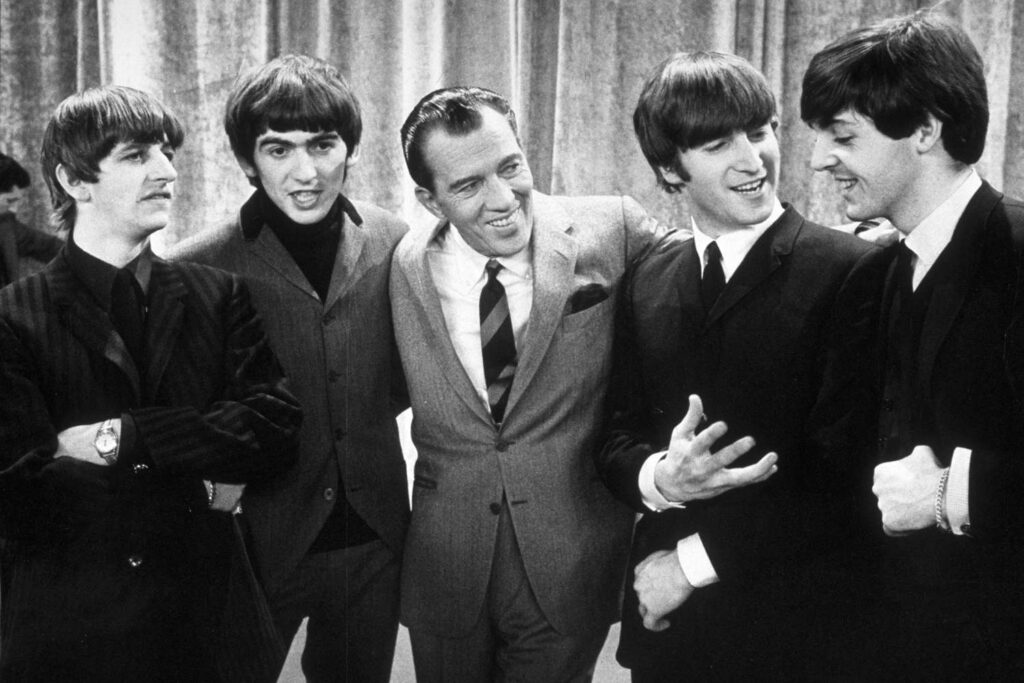NEED TO KNOW
Ed Sullivan has gone down in history as one of the most influential figures in rock & roll — without playing an instrument or singing a single note.
The Ed Sullivan Show, which ran from 1948 to 1971, famously helped launch Elvis Presley and the Beatles to stardom in the ’50s and ’60s. It was also one of the first programs to champion Black musicians at a time when segregation was the norm in TV programming and racial stereotypes were rampant.
Courtesy of Netflix
But for many, Sullivan, a man who looked more like your friendly neighborhood banker than one of the most influential tastemakers in music, was something of an acquired taste. In the new Netflix documentary Sunday Best — which tells Sullivan’s story in his own words using columns, articles and interviews — he recalls, through a voiceover recreation, his less-than-stellar debut as host of TV’s Toast of the Town, later renamed The Ed Sullivan Show.
“When I first went on TV with our Toast of the Town program, the experts told us to look directly into the camera,” Sullivan recalls. “This didn’t faze actors, but when I looked into those iron monsters, rigor mortis set in. TV critics urged CBS to get rid of me.”
He next rattles off some of the scathing reviews he received: “Why, oh why, is Ed Sullivan on TV?” “On camera, Ed has been likened to a cigar store Indian, a stone-faced monument, just off the boat from Easter Island.” “His smile is that of man sucking a lemon.”
“They knocked my brains out,” Sullivan continues. “And when I saw the show, I couldn’t blame ‘em. I was named The Great Stone Face of 1949. The abuse was so awful that my daughter Betty stopped reading the newspapers.”
“One story was that I had a steel plate in my head, and I received hundreds of letters congratulating me on my courage in continuing despite such a handicap,” he adds. “I never thought I was the attraction. I just kept looking for the best thing to put on the show.”
Courtesy of Netflix
He soldiered on, of course, and the rest is rock & roll and Black history. Billy Preston, Jackie Wilson, Bo Diddley, James Brown, Ike and Tina Turner, Gladys Knight and the Pips, Harry Belafonte, Nat King Cole, Nina Simone, Miriam Makeba, Mahalia Jackson, Stevie Wonder, the Supremes and the Jackson 5 are some of the iconic Black acts whose Ed Sullivan Show performances are shown in the documentary. A number of Black VIPs, including Smokey Robinson, Oprah Winfrey, Dionne Warwick, Jackie and Tito Jackson, Gordy and Belafonte, also pay tribute to Sullivan in interviews.
Born in New York City’s Harlem neighborhood in 1901, Sullivan started out as a sports journalist in the 1920s and pivoted to TV host with The Ed Sullivan Show. He died in 1974 at age 73, three years after his show left the air.
“He was a door opener, especially for Black artists,” Temptations singer Otis Williams says in the documentary. “This man opened up his door and let artists come on his show to be able to express and to be seen.”
Sunday Best is streaming now on Netflix.

